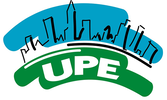About...A principal focus of the IUPEA publications and symposiums is on reducing and mitigating environmental spillovers in urban areas, including noise, air and water pollution, risk from fire and explosion, and remediation of polluted sites. These effects often constrain desired urban development, giving rise to conflicts between spatial/physical or land use planning on the one hand, and environmental policy on the other. Examples include residential use of otherwise desirable locations being precluded because of pollution from neighboring activities. These kinds of conflicts are found in both affluent and developing countries, and lessons from each can inform the other.
An extension of this set of concerns is the sharing of information about initiatives for sustainable urban development. This includes controlling sprawl, full-cost accounting for the developed use of land and other resources, and planning efforts to progressively limit green house gas emissions. It also includes efforts to account for environmental justice in the development of plans and projects |
Established in 1993Resolving conflicts between development and environmental policies is a complex undertaking that is increasingly important to communities and their governments. Residents are demanding greater livability in their cities, and quality of life is seen as a major source of competitive advantage in attracting business investment. Additionally, the recent exceptional growth of cities and urban regions is increasing the attention given to ways effectively balance social, economic and environmental ends in the planning and design of living and working areas. The emergence of these concerns increases the requirement for effective urban environmental planning, a field which is still being defined. Useful responses to these issues will also involve new analytical methods, new organizational strategies, and new ways to engage and involve affected parties effectively in developing democratically accepted programs.
The IUPEA fosters dialogue on these concerns, which in turn can inform and encourage development of solutions. The IUPEA, begun in 1993, is a nonprofit organization, operated on a voluntary basis, and is self supporting. |
Our MissionThe mission of IUPEA is:
– to foster the exchange of empirically-based information that can contribute to understanding and solving urban environmental conflicts; – to encourage research concerning ways in which urban planning can aid in this, and; – to assist in communicating this knowledge through publication programs and meetings. A series of international symposiums organized under the auspices of the IUPEA serves these ends by bringing together public officials, representatives of NGOs, researchers, planning professionals and environmental managers to hear and to critically respond to presentations based on experiences with initiatives to improve environmental living conditions in communities throughout the world. The formal and informal exchanges which take place at these events have proven to be a valuable source of ideas for designing new programs in still other communities, and in developing a network of people concerned with urban environmental quality and the environmental impacts of cities. |
The Board...
Sarah Coffin - Co-Chair
|
Peter Phibbs - Co-Chair
|
Donald Miller - Past Chair
|

